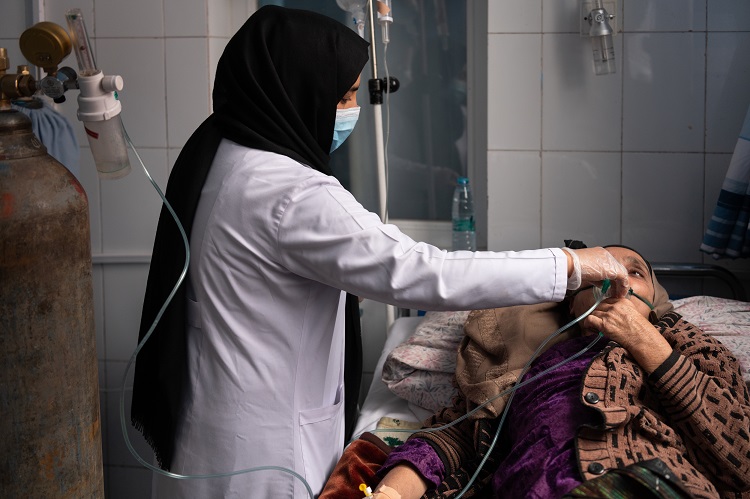
Cairo, 29 July 2021 – The circulation of the Delta variant is fuelling the surge in COVID-19 cases and deaths in an increasing number of countries in WHO’s Eastern Mediterranean Region. It is now being reported in 15 out of the 22 countries of the Region. The Delta variant is becoming the dominant strain of the virus in several of these countries, with infections mostly being reported among people who have yet to be vaccinated. It is more transmissible than the original virus and other detected variants of concern.
The Region has also reported a substantial increase in the number of COVID-19 cases and deaths over the past month, especially in the Islamic Republic of Iran, Iraq, Tunisia and Libya. Over 310 000 new cases and 3500 deaths have been reported on average on a weekly basis during the last 4 weeks, which is a 55% and 15% increase in the number of cases and deaths, respectively, compared to the previous month. Admission and hospitalization rates have increased in the last few weeks, and some referral hospitals are reaching full capacity and facing a shortage of intensive care beds and oxygen supplies.
“The rapid spread of the Delta variant across the Eastern Mediterranean Region and all other WHO regions is a major cause for concern. The number of new cases and deaths has increased in recent weeks. Most of the new cases and hospitalized patients are unvaccinated people. We are now in the fourth wave of COVID-19 across the Region. By applying effective use of all public and social health measures we will make sure that this is the last wave,” said Dr Ahmed Al-Mandhari, WHO Regional Director for the Eastern Mediterranean.
To date, the Region has documented over 12.3 million COVID-19 cases and nearly 233 088 deaths. The increasing transmissibility of new variants, increased social mixing, poor enforcement and adherence to public health and social measures, and inequitable vaccine rollout allow COVID-19 to continue spreading, infecting and killing people in the Region and beyond.
COVID-19 vaccines are effective in preventing severe outcomes from the Delta and other variants, but for vaccination to have an impact on the dynamic of the pandemic, we not only need a vaccine that is highly effective against infection but high vaccination coverage. As of the last week in July, only 41 million people, or 5.5%, of the Region’s population, had been fully vaccinated. Forty percent (40%) of the vaccine doses administered in the Region have been administered in high-income countries, which account for only 8% of the Region’s population. Until and unless vaccination coverage is increased equitably for everybody, everywhere, the virus will continue to circulate and mutate to produce new variants.
“The fight against COVID-19 is not yet over. Variants of concern are currently winning the race as vaccines are not being distributed equitably. WHO encourages countries to boost vaccination coverage and address the disinformation and vaccine hesitancy that prevent people from accepting vaccines,’’ Dr Al-Mandhari stressed. “The response to the COVID-19 pandemic is WHO’s largest emergency operation in history and our colleagues are working on every front against the virus. Similarly, we commend frontline health workers across the Region who have been working courageously and effectively over the past 18 months. They deserve our utmost gratitude and support. As a demonstration of solidarity, each of us must continue to do his or her part to control the pandemic – we have all the tools to defeat this virus; we just need to apply them vigilantly and consistently.”
Given the global shortages and grossly inequitable distribution of vaccines, WHO encourages higher income countries to donate doses to low- and lower middle-income countries. WHO has set a target for 10% of the population of all countries to be fully vaccinated by September, 40% by the end of 2021, and 70% by mid-2022, but this target will not be achieved unless high-income countries, many of which have already exceeded these targets, are willing to donate vaccines.








